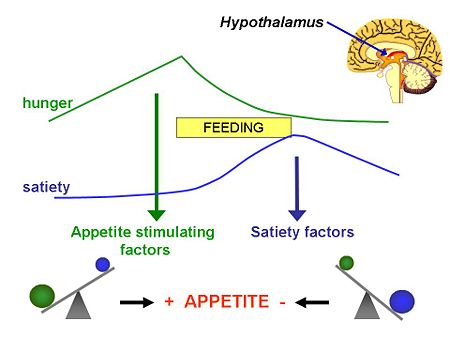Appetite
Jump to navigation
Jump to search
Appetite is the desire to eat food, and is experienced as hunger. Appetite in mammals is controlled by neural circuits in the hypothalamus which are influenced by hormonal and neural signals from the digestive tract, including the appetite-stimulating hormone ghrelin. The drive to eat is balanced by satiety signals from the digestive tract, and by feedback from adipose tissue - including by the hormone leptin. Appetite is also subject to sensory stimuli - the sight and smell of food, and is modulated by internal (circadian) rhythms; we are hungry at meal times. Appetite is also influenced by stress, and by physiological state - appetite is stimulated after exercise, and is enhanced in pregnancy.
